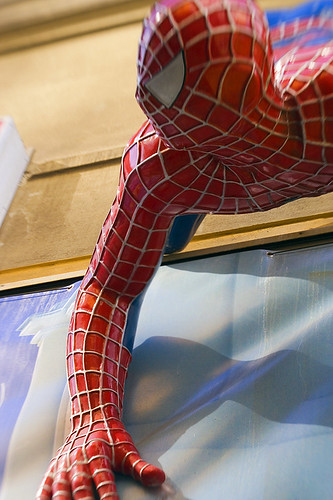

Superman, Wonder Woman, Spiderman--comic book heroes are easily recognizable by their costumes and abilities. They usually possess some sort of superhuman power and are dedicated to protecting the community around them. However, one man sees it a little differently; his hero is his nephew and the other soldiers fighting overseas.
James 'Mickey' Girvan created Afghan Tales, an original comic book series that follows his nephew, Lieutenant-Colonel Bud Walsh, and those serving with him during their time in Afghanistan.
The two regularly exchanged emails during LCol Walsh's tenure overseas. He was stationed with NATO from September 2008 until March 2009.
"I wanted to let him know that I was really paying attention to his letters," says Girvan, who himself was a member of the militia--the Highland Light Infantry, which is now disbanded. "So I took one story that he sent and I turned that into a comic book and sent that to him."
Volume One is titled Teamwork and chronicles one of the more humorous moments, where, due to excessive weight from all the kit he was carrying, LCol Walsh needed a little extra help scaling a wall from his Afghan counterpart.
"I picked that story out of a bunch because it was humorous and light-hearted and I felt safer doing the light-hearted one before I tackled anything serious," says Girvan, who went to the Ontario College of Art in Toronto back in the 1960s. "I didn't feel like jumping in, doing some serious battle scene--I didn't want to do some Hollywood type of story."
The seven-page volume was based on a photo and short letter written by LCol Walsh.
"When I read the story and read the text he has with it, I'm amazed at how close it is to exactly what happened in that little vignette of me trying to get up on a wall and coming back down afterwards," says LCol Walsh. "It just showed how much kit we were carrying compared to what the Afghan troops were carrying."
As he got more comfortable with his abilities, Girvan began putting a more serious twist on his comics. The Patrol and Fire Fight and Rescue both deal with more pressing realities overseas, such as the frustrations about set limits when conducting patrols and the disturbance it causes the local population.
"It's quite a powerful tool, using the comic book genre to tell a story, to explain something," says LCol Walsh. "There are always stories to tell and sometimes stories are difficult to tell. This could be a venue for that."
The story ideas have often come from a variety of LCol Walsh's emails that are then mashed together to create one comic. The Patrolis a collection of patrols that LCol Walsh's group completed over a period of time, with the most pertinent parts of each making it into the comic.
[ILLUSTRATION OMITTED]
"I would send him a few emails from time to time and a few more photos and with each photo perhaps two or three lines of the story," says LCol Walsh. "He calls it The Patrol but it's really a collection of many different patrols. He would ask a question about things like, 'what are you wearing, what are you carrying, why are you doing that?' He blends things together and makes it work. He's always been good at things like that."
Painting for most of his life, Girvan's love of art comes from the process and seeing the final, completed result.
"It's the sitting down and producing something--the doing, creating something, something new," he says. "It's the thought process that goes into it and the physical activity of doing it, the finished product. Of course you take the blame too if it comes out terrible."
Girvan has always been a fan of comics, and while attending college he and a friend tried to start their own comic series but ran into financial difficulties. Things have come a long way since then. Today, he uses a computer to help him with his graphics.
"I use software that's used by comic book drawing companies," says Girvan. "I load a photograph in and use it as a base to a drawing. I can use parts of it as is, take out parts and add my own things in."
LCol Walsh remembers his uncle's love of comics. "As a kid, I remember going to their house," he says. "They lived in a loft apartment above a restaurant in the Yonge and Bloor area and the building--being an old factory--had an old walk-in vault. He'd open the doors and walk in and there would be his comic book collection."
At the moment, Girvan only has his nephew's stories from his time in Afghanistan. However, he is hoping that will change and that more soldiers come forward with their accounts and let him immortalize them in comic form.
[ILLUSTRATION OMITTED]
"In painting a story, it is condensed down into one moment with no beginning or end. But in comic books the story Becomes myth, etched larger than life by the combined verbal and drawn elements," he says.
Plus starring in your own comic book would be really neat too.
For more information on Afghan Tales and to submit your own story, please visit http://members.shaw.ca/afghantales/
Source Citation
Cunha, Jessica. "Comic book hero." Esprit de Corps Dec. 2009: 32+. Military and Intelligence Database. Web. 2 Jan. 2010.
Gale Document Number:A214998764
Previous Next


No comments:
Post a Comment